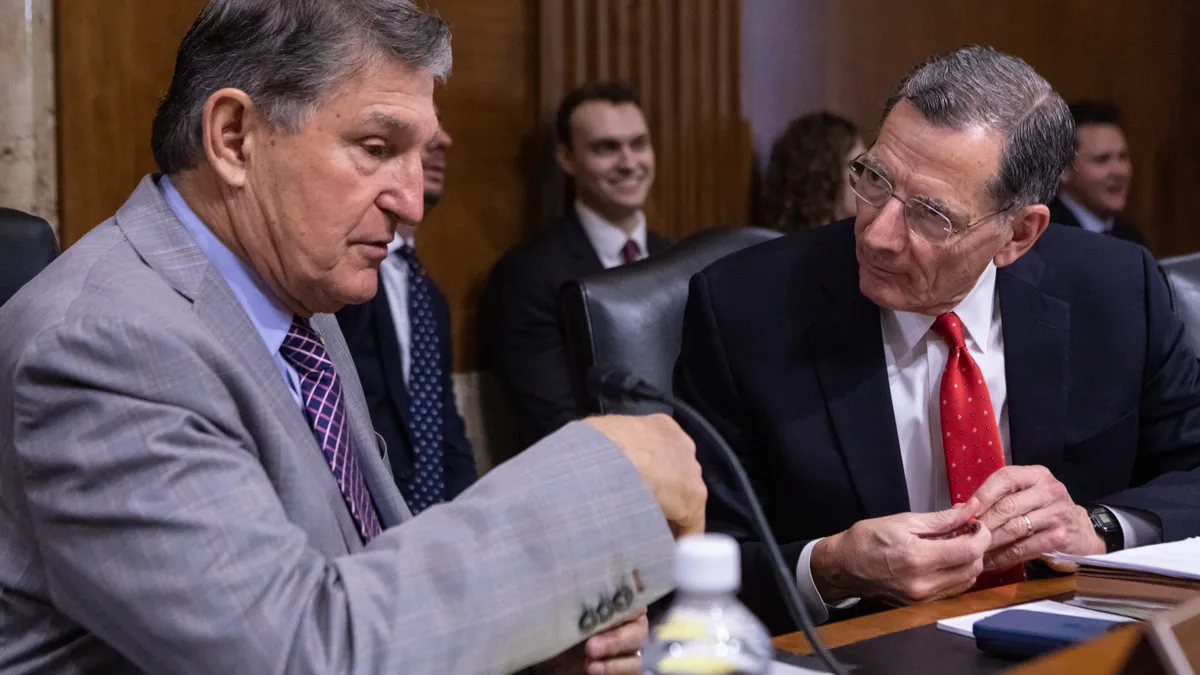Big News: Bipartisan Permitting Reform Legislation Is Moving!
- The bill now has a number — S. 4763
- It’s scheduled for markup by the Energy and Natural Resources Committee next Wednesday.
“Gradually, then suddenly.” That’s Hemingway’s description in The Sun Also Rises about how a business went bankrupt. That could just as easily describe the fast action around a bipartisan permitting reform bill introduced earlier this week in the Senate.
Co-sponsored by the top two leaders in the Senate Energy and Natural Resources Committee, Sen. Joe Manchin (D-WV) and Sen. John Barrasso (R-WY), the Energy Permitting Reform Act of 2024 has garnered support from CCL, clean energy groups as well as trade groups representing the fossil fuel industry. Some groups, like the Center for Biological Diversity and Earth Justice are solidly against the Act, and the Sierra Club says it falls short of their standards to get their support (yet?).

This post reports on the legislative timelines, links to statements from the various interest groups and summaries of the Act itself.
Legislative Timelines
The legislation is scheduled for “markup” in the Senate committee next week, with a view to moving the legislation for possible action in the Lame Duck session. Please note, our Senator Catherine Cortez Masto is a member of that committee and will be acting on it as it moves through Committee.
What about the House you ask? Or the White House?
Well, [and this is my view, not necessarily CCL’s] like most bipartisan legislation passed during this Administration, the White House has not taken a position and is unlikely to do so until they need to help the parties reach a final resolution acceptable to both sides.
Regarding the House, Rep. Scott Peters (D-CA) is a leader in the House on this issue. This Senate bill includes key elements contained in the SPEED and Reliability Act and the BIG WIRES Act offered by Sen. John Hickenlooper, D-Colo., and Rep. Scott Peters, D-Calif. And, with regard to this Energy Permitting Reform Ac of 2024, Representative Peters has stated: (full statement)
“I thank Senators Manchin and Barrasso for undertaking this bipartisan effort to streamline the permitting process and make it easier for America to build the energy infrastructure needed to power our booming economy. I am encouraged to see they included bold, meaningful reforms to transmission permitting and planning in their legislation, including core provisions of my SPEED and Reliability Act and BIG WIRES Act, like reducing duplicative reviews, requiring interregional planning, and moving to an applicant-driven process for national interest transmission projects. They also take strong steps to streamline the siting and permitting of clean energy resources on federal lands.
“While this is a strong first step, there is still much work to be done and I look forward to continuing my talks with House Natural Resources Chairman Bruce Westerman on our own permitting reform proposal.”
That sounds to me like something legislative leaders say when House and Senate versions of bills differ and negotiations need to reconcile conflicting or non-overlapping details before sending a final version to the President for signature. Stay tuned!
As reported by Politico’ s E&E News
The legislation will be controversial. Evidently, the effort was led by Sen. Manchin, who wants to see it pass as part of his legacy of bipartisan legislation. Ultimately, Barrasso co-sponsored the bill, but it’s unclear whether it will garner broader support on either side of the political aisle.
People familiar with the situation, granted anonymity to speak candidly, said Manchin was hoping for a markup before August recess. Barrasso, who is running for Republican whip, is said to be speaking with members of his party about the legislation. Many have not been eager to give Manchin a policy win or make it easier for developers to run power lines across their states.
Democrats, for their part, may be unwilling to accept the bill’s grid provisions if they’d also have to support policies like tighter litigation timelines.
As reported in Utility Dive, an industry newsletter,
“Bipartisan permitting and transmission reform is a welcome development to keep energy costs down and supplies reliable,” Devin Hartman, director of energy and environmental policy at the R Street Institute, said in an email Tuesday. Moving the legislation will be “challenging” this year, and the best odds of action may be during the “lame duck” session after the election, Hartman said.
If the bill doesn’t pass this year, it moves permitting and transmission reform up the agenda for the next Congress, Hartman said, pointing to buy-in from the previous Congress that made last year’s permitting reform possible.
“As grid reliability authorities continue to reveal the merits of transmission expansion, I would expect momentum for interregional transmission reform to build as well,” Hartman said.
Summary of Provisions
Senator Manchin’s announcement included links to
- A one-page summary
- The full text
- A 12-page, section-by-section summary
Interest Group Support
CCL issued a statement yesterday saying CCL applauds the bipartisan introduction of sweeping energy permitting bill. Dana Nuccitelli, Research Coordinator for CCL, also summarized the main provisions in a document showing how it compares and contrasts with other, similar legislative proposals. The CCL blog post announcing the support also has a few paragraphs that indicate why CCL supports the provisions.
The Energy Permitting Reform Act of 2024 has garnered support from both the Independent Petroleum Association of America (IPAA), which advocates for thousands of oil and natural gas producers that develop 90 percent of wells nationwide, and the American Clean Power Association (ACP), which represents over 800 energy storage, wind, utility-scale solar, clean hydrogen, and transmission companies.
“After listening to the concerns and frustrations of users of multiple-use lands across the industry, Senators Manchin and Barrasso worked together to help reduce much of the unnecessary red tape that hampers independent producers operating on federal onshore and offshore lands,” said Dan Naatz, the chief operating officer and executive vice president for IPAA. “This legislation increases American energy security and IPAA appreciates the senators’ thoughtful approach to these important issues.”
ACP Chief Executive Officer Jason Grumet pointed out that the nation’s future success and strength rests on building modern systems to produce, store, and distribute energy. And while the U.S. has the technology, workforce, and financial capital to build such great things, he said the nation lacks a governing process for success.
“This legislation changes that,” said Grumet, and “will help our nation meet the growing demand for electricity, deploy transmission lines to deliver clean, reliable power, and strengthen American energy security.”
Utility Dive, an industry newsletter, also has a good summary of the bill and some reporting on interest group support. They found that transmission and clean energy groups said they generally back the bill. This includes:
- The American Clean Power Association,
- The Solar Energy Industries Association,
- The American Council on Renewable Energy,
- Advanced Energy United
- Americans for a Clean Energy Grid.
Specifically, here are some statements of support. This one from Advanced Energy United
Congress should build on the bill’s “framework” to develop “comprehensive permitting reform that supports America’s transition to an economy built on advanced energy,” according to Advanced Energy United, a trade group.
“This bipartisan proposal provides a good foundation on which to build a comprehensive package of legislative reforms,” Harry Godfrey, AEU managing director, said in a press release. “Both parties agree that unreasonable timetables and fragmented planning processes are making it too difficult to invest and build.
Americans for a Clean Energy Grid.
“FERC gaining plenary authority for transmission siting — just like it has for natural gas — would represent an important change in how the federal government permits transmission infrastructure in a timely and transparent manner,” Christina Hayes, ACEG executive director, said in a statement.
The Bottom Line: “It’s a Really Good Bill”
CCL has been told to expect some modeling results soon to estimate the bill’s impact on climate pollution. Dana said
We anticipate that the emissions reductions from the transmission and clean energy permitting provisions will far outweigh any small increases from the fossil fuel provisions. Overall we think it’s a really good bill! As Ben put it in the statement linked above, “The Energy Permitting Act of 2024 represents a giant leap down the path of building new clean energy infrastructure that will lower emissions, decrease costs, and increase reliability for people nationwide.”

